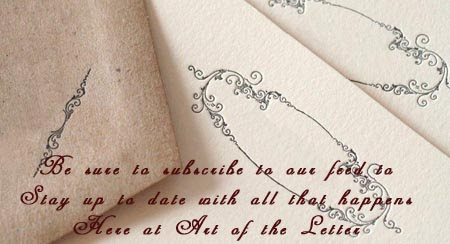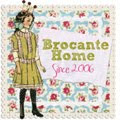Drew Barrymore: Advocate for Old-Fashioned Correspondence
 Drew Barrymore has a penchant for writing letters, and when it comes to corresponding, she eschews faster forms of conveyances in favor of the handwritten. She considers it more meaningful to pen a note, and insists people write letters to her instead of sending an email or other electronic communication.
Drew Barrymore has a penchant for writing letters, and when it comes to corresponding, she eschews faster forms of conveyances in favor of the handwritten. She considers it more meaningful to pen a note, and insists people write letters to her instead of sending an email or other electronic communication.In method preparations for her Golden Globe award-winning role in the 2009 HBO movie Grey Gardens, she isolated herself from all modern communicative technologies, and limited herself to letter writing as a way of entrenching herself into her vintage character, Little Edie Beale. Barrymore went into seclusion, “No contact with friends, no cell phones, no Black Berry, no newspapers, no magazines, no computers, no cars, no television. Nothing, for three months,” she said. "But she’d write,” said on-again, off-again boyfriend, Justin Long. Long tells of her creative letter writing, "She'd write beautiful, profound, poetic letters on a typewriter."
As for the subject of the letters, Drew revealed, "They were about my fears of not being able to pull this character off; this icon, and about learning a level of discipline… about facing your fears." Barrymore said the old-fashioned letters, which she wrote on an avocado green IBM Selectric typewriter, helped her work through her jitters about the part. "I had to understand what isolation was really like."
Even after the role ended, Drew explains "I still write letters. I don't want to communicate in a relationship via text and email. I love a letter. You are thoughtful when you write it, and someone can read it, and hold onto it, and go back to it. For me, there's something very dangerous to have everything so instantaneous."
The star of Grey Gardens has wishes for social betterment, where folks become more gracious and mindful of their manners. As in times past, people were polite and ceremonial in their conduct, and acted out of consideration. She longs for a resurgence of this courtesy and gallantry, “There's a part of me that misses the grace and formalities of the past," says Drew. "Like, when gentlemen wore hats and opened doors.” Although, she is not all old-school airs and elegance. “I love that now, we're not trying to pretend so much that everything is prim and proper,” laughs Drew. “I'd like to find a balance."
 Both gorgeous photographs are of Drew Barrymore looking like an old-Hollywood, living vintage doll in an Alberta Ferretti gown, and a true vintage headpiece as she appeared at the Ziegfeld Theater, New York City premiere of Grey Gardens.
Both gorgeous photographs are of Drew Barrymore looking like an old-Hollywood, living vintage doll in an Alberta Ferretti gown, and a true vintage headpiece as she appeared at the Ziegfeld Theater, New York City premiere of Grey Gardens.The exceedingly interesting characters of "Big Edie" and "Little Edie" are true-to-life socialites from an era past. Edith "Big Edie" Ewing Bouvier Beale and her daughter Edith "Little Edie" Bouvier Beale were the aunt and first cousin of Jacqueline Bouvier Kennedy Onassis. The two women lived together at Grey Gardens, a decrepit mansion at 3 West End Road, in the wealthy neighborhood of East Hampton, New York for decades with limited funds, resulting in squalor and almost total isolation. The home became the center of quite a scandal when it was revealed in 1973 that the reclusive aunt and cousin to Jackie O. were living in a state of poverty and filth.
Both the original documentary, and the modern HBO movie, are critically acclaimed, award winning, and gleamingly reviewed by viewers.



















